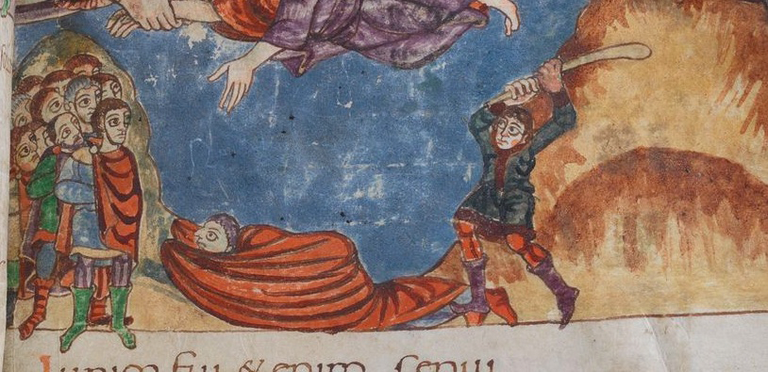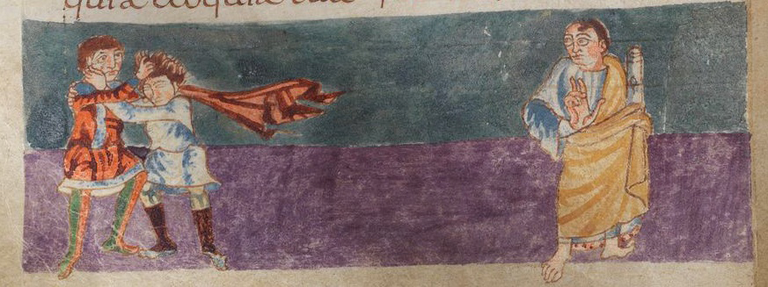Lectures: 11th Annual M.I. Rostovtzeff Lecture Series
11th Annual M.I. Rostovtzeff Lecture Series
"As If: Fiction, Make-Believe, and the Legal World of Early Medieval Francia, 5th-9th Centuries AD"
Alice Rio, King's College London
The Rostovtzeff Lectures are supported in part by a generous endowment fund given by Roger and Whitney Bagnall
RSVP Here
 Alice Rio, King's College London
Alice Rio, King's College London
Alice Rio is a Professor of Medieval History at King’s College London. She is the author of Legal Practice and the Written Word in the Early Middle Ages: Frankish Formulae, c. 500-1000 (Cambridge, 2009) and Slavery After Rome, 500-1100 (Oxford, 2017), and has published on various aspects of early medieval law and social life.
Early medieval Francia was a world filled with law; yet profound doubts as to the reach and relevance of law to social life have made this plentiful evidence tricky to assess. These lectures attempt to recast the problem by arguing that the reason these things don’t add up now is because they did not add up then. Legal activity was driven by the need to convert hard-to-solve real-life conflicts into legal problems. This process of translation allowed the deployment of often highly fictionalized representations both of legal processes themselves and of society more widely. While these representations needed to be basically plausible, the absence of any homogenizing forces encouraging consistency meant they could take quite different yet valid forms from one case to the next, which is why examples from either law or legal practice can paint such radically different pictures of both authority and society – and why these pictures in turn are so often contradicted by other evidence. Looking at things in this way can help to see the gap between law and practice no longer in terms of a barrier which law consistently failed to clear, but as a busy and fruitful zone, whose potential contemporaries exploited creatively.
 Stuttgart Psalter (Württembergische Landesbibliothek Stuttgart, Bibl. fol. 23), fol. 47r.
Monday, May 10, 2021 - 2pm
Stuttgart Psalter (Württembergische Landesbibliothek Stuttgart, Bibl. fol. 23), fol. 47r.
Monday, May 10, 2021 - 2pm
"What Was Legal about Early Medieval Legal Culture?"
This lecture sets up the basic framework for the series, and its broad line of argument. Most of the existing historiography tends to assume that the bigger the gap between written norms and legal practice, the more irrelevant the norms must have been. Such gaps, however, could be productive in their own right. Once law is understood as a starting-point for the construction of scenarios, rather than dictating outcomes, one can start to see why the most useful laws might not necessarily always have been the ones that came closest to the practical solutions eventually reached. The process of reinventing the social world as a set of knowable legal objects allowed for creative misconstruing, which intervened in different ways in both norm and practice.
Wednesday, May 12, 2021 - 2pm
"Procedure: Heroic Fantasy and Bureaucratic Fancies"
One of the areas on which surviving legal evidence provides some of the most contradictory views is the legal and administrative framework itself. I will take the written word and feuding as examples. Surviving texts can give very different impressions of the importance of written documents, and it is possible to read early medieval evidence either to support a literate, almost bureaucratic vision of legal rights, or to view literate forms as a distorting sideshow. I suggest this shows that the importance of the written word depended not on stable assumptions about the value of writing, but instead on a collective agreement about how important it was going to be in any particular case. People could, if they were able to get enough other major participants to play along, behave as if they lived in a world where all rights had to be recorded in a written document as a normal and systematic part of life – even when this expectation was evidently not sustained on anything like a consistent basis. Similarly, one could choose to behave as if there was a strong, Roman-empire-style state which ought as a matter of course to be involved in legal proceedings, or not – which is partly why the problem of whether or not there was such a thing as “feuding” during this period has proved so intractable.
Friday, May 14, 2021 - 2pm
"Slaves and Slavery"
 Stuttgart Psalter (Württembergische Landesbibliothek Stuttgart, Bibl. fol. 23), fol. 141v
Stuttgart Psalter (Württembergische Landesbibliothek Stuttgart, Bibl. fol. 23), fol. 141v
The legal framework for slavery was long thought by historians to have been carried over from the ancient world long after it had ceased to hold any relevance to the ways early medieval power and dependence (in their own ways brutal, but different) were exercised or experienced. This is a key example of a field in which legal representations remained effective precisely because they allowed – indeed, demanded, in order to be discussed in legal terms at all – a radical reinterpretation of reality, in which lords of tenants might take on the roles of masters of slaves along Roman lines. There were, in fact, people who by any definition of the term were slaves in the early middle ages, but in their case extreme subjection in daily life mostly sufficed to establish status. Legal conflict, by contrast, involved essentially people who look very unlike slaves (that is, unsurprisingly, those with a relatively higher capacity for resistance), and this was sufficient to create a radical apparent disjunction between norm and practice. The two, however, could work together with chilling effectiveness not only in spite of, but partly because of the gap between them.
Monday, May 17, 2021 - 2pm
"Legal Relationships and Density of Regulation: The Example of Families"
This lecture looks at early medieval families, and the types of misconstruing involved in constituting them and their members as legal concepts. This, like the example of slavery, will lead us to reconsider the issue of gaps in normative legal material, and the possible reasons for density of regulation. Which human relationships were most and least densely legally defined and rule-bound seems to have had very little to do with which relationships were most open to becoming fraught or conflict-ridden, or with the levels of coercion required to keep them going.